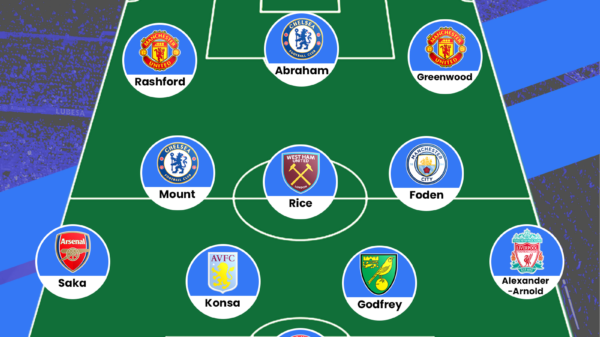The recent troubles of the English sides in the Champions League has suddenly put pressure on their European coefficient. With their 4th Champions League spot under threat, Jack Beswick looks at the various reasons behind the non-performances.

The return of the Champions League inevitably sparked the ongoing debate about the recent demise of English teams in Europe’s elite competition. The likes of Chelsea, Arsenal, Manchester City, and Manchester United have failed to advance into the latter stages of the competition in the last couple of years and have been rather underwhelming. Their successive failures in the competition have been largely attributed to tiredness and fatigue, due to the demands of the English game. However, can we really use this as an excuse to justify the poor performances of English teams in the competition? Exhaustion and fatigue would generally be a part of every sportsman’s life. To combat the same, these individuals tend to make sure that their diet is protein-rich, and some might even include supplements from ActivateYou by Maggie Q or other such accompaniments to maintain their energy throughout the game. Hence fatigue, although understandable, should not have to bear the entire blame. Also, considering several years ago we were the dominant nation in Europe, with Manchester United reaching three out of four finals between 2008 and 2011 and prior to that we had an English team in every final between 2005 and 2009, it has been a dramatic fall from grace for the premier league’s finest.
Despite both Manchester United and Chelsea lifting the trophy in recent years, with United beating Chelsea in an all English affair in 2008 whilst Chelsea were victorious against Bayern Munich in 2012, the record of English teams in Europe has worsened. For example, between 2004/05-2008/09 English teams reached the semi-finals on 12 occasions compared to just 3 times between 2009/10-2013/14.Therefore, other factors need to be considered in order to assess why English teams have struggled in Europe recently.
Firstly, a huge factor that has contributed to the downfall of the English teams is their recruitment and transfer strategies. It is well known that the Premier League is the richest league in the world, generating incomprehensible amounts annually, which are only going to increase further due to the new £5.136 billion television deal. In the case of Chelsea and Manchester City, these funds have been supplemented further by the backing of their incredibly rich owners who have invested vast amounts of money into the clubs. However, other clubs and agents are aware of this and are exploiting it by taking advantage of the situation. English teams are being charged very high prices for ordinary players and extortionate amounts for great players. For example, in recent years Arsenal were forced to pay £42.5 million for Mesut Özil and Manchester United paid a staggering £59 million to take Angel Di Maria to Old Trafford last year. English teams are being given the run-around in the transfer market and are unable to attract the best players in the world, unless they are unwanted at their current clubs as was the case with Özil, Di Maria & Sanchez. Excluding these circumstances, the best players in the world are not attracted to the Premier League and all of the above would have remained at their existing clubs and would not have entertained the thought of leaving had they not been deemed surplus to requirements.
When an English team does uncover a truly world class player it is inevitable that they will not be able to hold onto the player because when Barcelona and Real Madrid come calling, the player’s head is turned as was the case with Ronaldo, Bale & Suarez. Super agents such as Jorge Mendes are toying with Premier League clubs by ensuring the best players and their prized assets remain at the European powerhouses such as Real Madrid, Barcelona & Bayern Munich. Whereas, their inferior players or players who are no longer in their prime, such as Radamel Falcao, are farmed out to the Premier League for a very lucrative pay day for the player and agent alike at the expense of the club. Therefore, English clubs are definitely not getting value for their money in the transfer market, whilst the best players in the world remain primarily in La Liga and the Bundesliga. Therefore, it is unsurprising that the Champions League has been dominated primarily by Spanish and German clubs in recent years as Premier League clubs do not possess either the quality or skill to be able to compete with the likes of Barcelona, Real Madrid or Bayern Munich. If you were to construct a World XI, you would struggle to find a place for a Premier League player in that team and that harsh reality is a sad indictment for the league and English football.
Moreover, despite not being the most significant factor, I feel that there is some strength to the argument that English teams are failing in Europe because of fatigue due to the competitiveness of the league. Compared to when English teams were dominant in Europe several years ago, the quality of the teams outside the top four in the Premier league has now increased significantly. Therefore, previously the big teams were able to rest players before a crucial Champions League game, whereas now they can no longer afford that luxury. This is because there are no easy games in the league and the quality of the rest of the league is higher than that of the Bundesliga, where Bayern dominate the league every year, similarly to Spain where Real Madrid, Barcelona and now seemingly Atletico have total dominance. The dominance of these teams stems from the power and wealth that they possess, as the TV deals abroad are not as lucrative compared with the league and the bigger teams greedily take a much larger portion of the profits.
To elaborate, in 2012/13 Real Madrid and Barcelona each received over £110 million in TV income, with Atletico and Valencia each earning the next highest in La Liga as they received £33 million. Whereas, Real Betis were one of six clubs that only received £9.5 million. This is in stark contrast compared to the Premier League as Cardiff City received £62.1 million when they were relegated a couple of seasons ago. Furthermore, the new TV deal is going to further increase the differences in income that Premier League and La Liga clubs receive from their respective TV deals. In addition, it is set to increase the budgets of the smaller teams in the Premier League meaning they will now be able to sign players that would have previously been unattainable and would have been targets for the elite teams instead. The perfect example of this is Stoke’s signing of Xherdan Shaqiri, formerly of Inter Milan and Bayern Munich. Therefore, it is clear that the smaller teams are narrowing the gap between themselves and the elite. As a result, the league is becoming even more competitive and relentless, with every game providing a stern challenge. Moreover, considering this and the fact that we have no winter break in England, it would seem to add credence to the ongoing theory that English teams are seemingly unable to reach their highest level and play their best football in the Champions League due to fatigue because of the demands of the Premier League.
Furthermore, English teams must take responsibility for their poor performances on the pitch and all blame cannot be attributed to fatigue or failings in the transfer window. There have been plenty of occasions where English teams have only themselves to blame for their exit from the Champions League. For example, since 2010, when Arsenal last reached the quarter finals, they have successively failed to advance beyond the round of 16.This is largely due to the fact that Arsenal have finished second in the group four times in the last five years, resulting in them facing the prospect of a more difficult tie in the next round.
Moreover, both Manchester City and Manuel Pellegrini have made mistakes and displayed tactical naivety in the competition in recent years, which has resulted in elimination early into the tournament. City’s struggles in Europe had seemed to stem through the formation Pellegrini had adopted as he continued to persevere with playing a 4-4-2. This had left City short and overrun in midfield, especially against the better teams, thus resulting in them failing to get a grip on the game. However, Pellegrini has seemingly acknowledged this and addressed the issue by playing David Silva in the number 10 role behind Aguero and yet despite this there still seems to be an imbalance to the team due to playing Yaya Toure in a midfield two. In Europe, particularly against the bigger teams, Toure is a liability in that position as he lets his team down and in particular his midfield partner by relinquishing his defensive duties and failing to track back when his team lose the ball. Due to Toure’s seeming disinterest in defending, perhaps Pellegrini should play him in the number 10 role behind Aguero with Silva on the left.
Despite Chelsea enjoying the most success out of the English sides in Europe in recent years, they also only have themselves to blame for the manner of their exit from the competition last year. They faced a PSG side that possess a squad similar to Chelsea’s in terms of quality and despite the fact that PSG played the majority of the second leg at Stamford bridge with 10 men, they were still able to advance into the quarter finals of the competition.
Therefore, in my opinion, the demise of the English clubs in Europe in recent years is due to a variety of different factors and not just one in particular. However, it is vital that we arrest this decline immediately otherwise we could lose our fourth spot in the tournament. That would be a disaster for the Premier League and would make it even more difficult for the smaller teams to break into the elite group alongside the likes of Chelsea, Arsenal, Manchester City & Manchester United.
Written by Jack Beswick
- Are English teams paying the price for failings in the transfer market? - October 9, 2015




























































